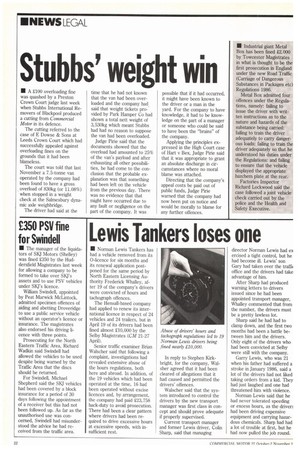Stubbs' weight win
Page 22

If you've noticed an error in this article please click here to report it so we can fix it.
• A £100 overloading fine was quashed by a Preston Crown Court judge last week when Stubbs International Removers of Blackpool produced a cutting from Commercial Motor in its defence.
The cutting referred to the case of E Dowse & Sons at Leeds Crown Court which had successfully appealed against overloading fines on the grounds that it had been blameless.
The court was told that last November a 7.5-tonne van operated by the company had been found to have a gross overload of 830kg (or 11.08%) when stopped in a weight check at the Salmesbury dynamic axle weighbridge.
The driver had said at the time that he had not known that the van had been overloaded and the company had said that weight tickets provided by Park Hamper Co had shown a total nett weight of 3,530kg which meant Stubbs had had no reason to suppose the van had been overloaded.
Judge Pine said that the documents showed that the overload had amounted to 25% of the van's payload and after exhausting all other possibilities, he had come to the conclusion that the probable explanation was that something had been left on the vehicle from the previous day. There was no evidence that that might have occurred due to any fault or negligence on the part of the company. It was possible that if it had occurred, it might have been known to the driver or a man in the yard. For the company to have knowledge, it had to be knowledge on the part of a manager or someone who could be said to have been the "brains" of the company.
Applying the principles expressed in the High Court case of Hart v Bex, Judge Pine said that it was appropriate to grant an absolute discharge in circumstances where no moral blame was attached.
Directing that the company's appeal costs be paid out of public funds, Judge Pine warned that the company had now been put on notice and would be morally to blame for any further offences.














































































